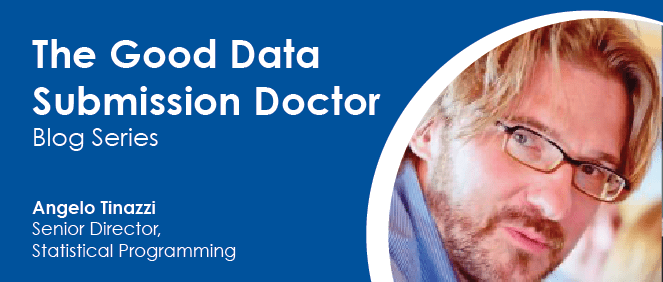Data Standards and Submission Highlights from PHUSE EU CONNECT 2020


The Virtual PHUSE-EU CONNECT Conference was held from November 8 to 13 and the event was a great success, despite all of us missing the face-to-face contact.
The conference kicked-off on Sunday night with a Social Virtual event with a “Numerologist Show”. Of course this could not replace and compete with the usual “toast” we were used to do live, so we did it virtually (check out my LinkedIn post where I offer some cocktails recommendations and share the recipe of my favorite cocktail “The Negroni” with a bit of history. But please don’t do it before Friday night, you will need the weekend to recover).
Like every year, Cytel significantly contributed to the event as one of the official sponsors, running a workshop (“Predictive Analytics Using R”), chairing and co-chairing two streams (Machine Learning & Connected Health and Scripts and Macros), preparing four on demand presentations (in Application and Development, Coding and Tricks and Data Standards and Governance streams) and two posters.
In this blog, I focus on presentations related to data standards and data submission to agency, in general.
“Regular Update and Panel Discussion” by Lilliam Rosario Director, Office of Computational Science, CDER FDA.
Dr. Rosario provided an update on the number of electronic submissions received by the CDER division in 2019; 99% of the submissions are in eCTD format. In the other updates from Dr. Rosario, a strong focus was laid on the conformance of the electronic submissions received that has significantly improved for NDA, ANDA and BLA; However, for IND the failure rate is still significantly high (around 60% by Q2 of 2020) despite a significant drop in the % of “failures”. This is a bit surprising given the current limited set of rejection criteria defined by the FDA that could cause the rejection of your submission. One of the main causes of failure is either missing Trial Summary (TS) dataset in the SDTM data package or improper information reported on it. This is really a basic requirement! FDA has developed a “Technical Rejection Criteria Self-Check Worksheet” that sponsors can use as a checklist before submitting a data package; this can help sponsors avoid unwanted surprises.
CDISC 360 Workshop
The CDISC 360 Workshop provided updates from the different working streams, with the first deliverables planned for Q1 2021 (“Data Collection Instruments”). From this initial phase of the project, the “Analysis Results” was recognized as one of the main gap in the standards if we really want to achieve a full “end-to-end ”. For this reason, in collaboration with PHUSE, the “Analysis Results Standards” project was launched. During the workshop, the new version of the CDISC library was also introduced (it was released the day after the workshop).
The CDISC library was also the subject of a number of presentations, describing its use and implementation in tools developed by some of the vendors presenting at the event.
Standards and Submission
As usual, Standards and Submission to Agency were again probably the hottest topics among all. From all of the streams, I counted more than 40 presentations including posters, workshops and software demonstrations included a discussion of Foundational Standards e.g. SDTM, ADaM, etc.
Among these 40 contributions, I would like to focus on the ones from two sponsors in particular, Novo Nordisk and Roche.
I liked the way Novo Nordisk (NN) approached standards and their implementation and governance, with a mix of creativity and "strictness". Two interesting contributions:
- NMPA Submission (Data Submission in China) by Marianne Caramés and Sujit Khune: This was sort of an update of the presentation provided at the last CDISC-EU Interchange. For PHUSE, they also integrated new content from the draft guidance “Submission of Clinical Trial Data” released in last July. This appears to be the first step for the Chinese authorities for future possible mandatory requirements for CDISC data standard submission with requirements quite aligned to what the other agencies, such as the FDA and PMDA, currently require.
- Strategies for Writing the ADRG by Ari Siggard Knoph and colleagues: I like the education process they implemented at NN as authoring an Analysis Data Reviewer Guide (ADRG) also requires good writing skills
- The Good? The Bad? Or the Ugly? CDISC eSubmission Packages in Practice by Artur Krupa: Good to see I’m not alone in the battle of defending the respect and honor of data standards (see my “CDISC Stupidario” poster at PHUSE 2018)
- A Rose By Any Other Name – Our Experience with an RTOR-like Neuroscience Filing by Emma Moore, Dave Summers and Carolyn Fisher: A description of Roche tackling a challenging FDA submission requiring Real Time Oncology Review. See here for more details about the FDA RTOR pilot-project.
- Effective Data Integrations: A poster presented by Nicola Perry and Kirsty Wall where they shared different possible scenarios for integrating data at the SDTM and/or ADaM level. On the same topic, I recommend a recent published PHUSE white paper “Integration Strategies in Support of ISS/ISE Submissions” that was released last October.
I would probably need another article to report on other interesting learnings and experience that were shared on the use and submission of data standards, so I’ll conclude with Cytel’s data standards contributions:
- Presentation AD03 “TidyCDISC: An Open-source Application to Interactively Create Tables, Figures, and Patient Profiles from ADaM Data” – A presentation of an open source application developed in collaboration with one of our sponsors. The application makes use of source data in ADaM format.
- Presentation DS07 “ADaM is back: The new ADaM IG 1.2 and beyond” - A quick refresh on the CDISC ADaM “status quo”
- Poster PP02 “Please take care of your metadata” - Recommendations for keeping your SDTM-ADAM traceability through metadata, a current gap in conformance rules and available validation tools
- Poster PP18 “Data Standards for Non-interventional Studies” - Outcome of a PHUSE working group.
PHUSE will release a copy of the slides and papers in the following weeks. However, do not hesitate to contact us if you want to receive a copy of the presentations by the Cytel team.
About Angelo Tinazzi
 Angelo Tinazzi is Senior Director, Statistical Programming, Clinical Data Standards and Clinical Data Submission at Cytel. He is a well- published and recognized expert in statistical programming with over 20 years' experience in clinical research. The application of CDISC standards in different therapeutic areas is part of his core expertise since 2003 in particular in the context of data submission to health authorities such as the FDA and PMDA.
Angelo Tinazzi is Senior Director, Statistical Programming, Clinical Data Standards and Clinical Data Submission at Cytel. He is a well- published and recognized expert in statistical programming with over 20 years' experience in clinical research. The application of CDISC standards in different therapeutic areas is part of his core expertise since 2003 in particular in the context of data submission to health authorities such as the FDA and PMDA.
Angelo is an authorized CDISC instructor and member of the CDISC ADaM Team as well as the CDISC European Committee where he also manages the Italian-speaking CDISC User Network.


